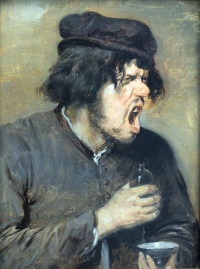Abhorrence
From The Art and Popular Culture Encyclopedia
(Difference between revisions)
| Revision as of 17:11, 26 December 2013 Jahsonic (Talk | contribs) ← Previous diff |
Revision as of 06:56, 27 September 2016 Jahsonic (Talk | contribs) Next diff → |
||
| Line 14: | Line 14: | ||
| #* Pride, '''abhorrent''' as it is - I. Taylor | #* Pride, '''abhorrent''' as it is - I. Taylor | ||
| ==Etymology== | ==Etymology== | ||
| - | First attested in 1449. From Middle English ''abhorren'', from Latin ''abhorreō'' (“shrink away from in horror”), from ''ab'' (“from”) + ''horreō'' (“stand aghast, bristle with fear”) | + | First attested in 1449. From Middle English ''abhorren'', from Latin ''abhorreō'' (“shrink away from in horror”), from ''ab'' (“from”) + ''horreō'' (“stand [[aghast]], bristle with fear”) |
| {{GFDL}} | {{GFDL}} | ||
Revision as of 06:56, 27 September 2016
|
Related e |
|
Featured: |
- abhorrence, a sense of loathing, intense aversion, repugnance, repulsion, horror
- A sudden violent feeling of disgust.
Adjective
abhorrent
- Abhorring; detesting; having or showing abhorrence; loathing; hence, strongly opposed to; as, abhorrent thoughts.
- The persons most abhorrent from blood and treason - Burke
- The arts of pleasure in despotic courts I spurn abhorrent - Clover
- Contrary or repugnant; discordant; inconsistent; -- followed by to.
- Injudicious profanation, so abhorrent to our stricter principles. -- Gibbon
- Detestable
- Pride, abhorrent as it is - I. Taylor
Etymology
First attested in 1449. From Middle English abhorren, from Latin abhorreō (“shrink away from in horror”), from ab (“from”) + horreō (“stand aghast, bristle with fear”)
Unless indicated otherwise, the text in this article is either based on Wikipedia article "Abhorrence" or another language Wikipedia page thereof used under the terms of the GNU Free Documentation License; or on research by Jahsonic and friends. See Art and Popular Culture's copyright notice.


